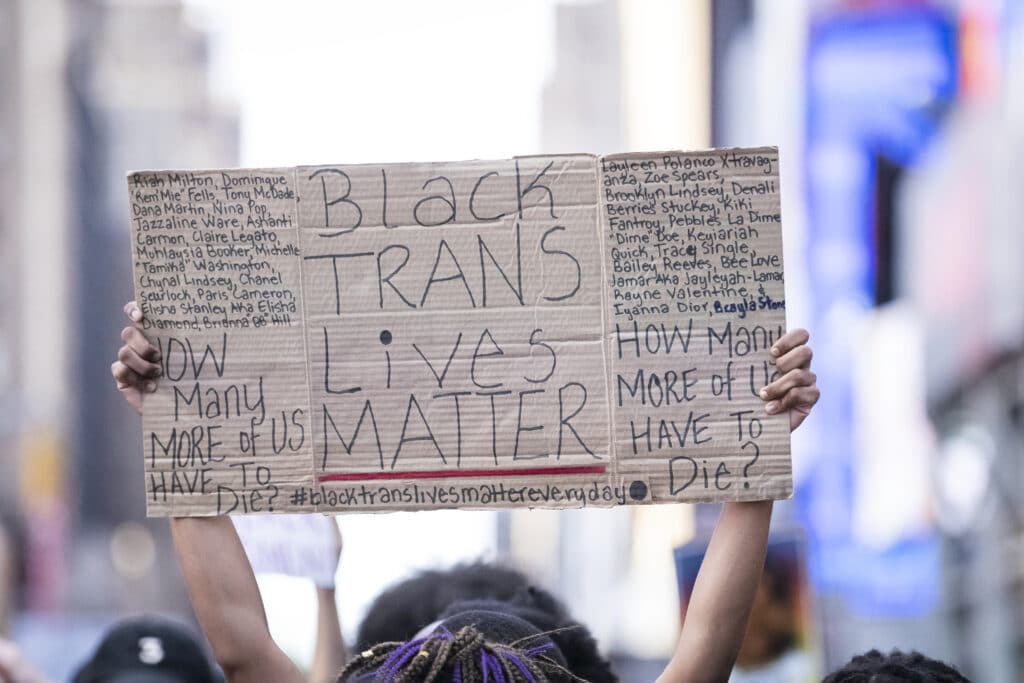Willow Andring, a 14-year-old transgender high school freshman, said she faces regular harassment at her school, Armstrong Junior-Senior High School in Kittanning, about 45 minutes northeast of Pittsburgh.
A classmate yelled at her to get out of the girl’s restroom, and she’s been called both racist and homophobic slurs, she said.
In late October, that harassment escalated, and she was left with a concussion after another student attacked and beat her in an incident that was caught on camera and shared on social media.
Willow said she was nervous to return to school after that. “I’ve been sort of just hanging with my friends and trying to stay safe but also still have fun at school and learn,” she said.
Police are investigating the incident, and the Armstrong School District issued a statement last month vowing to punish the student who attacked Willow.
“The administration and the school board are well aware of this incident and the video tape that is circulating,” Todd Luke, president of the Armstrong School Board, said in the statement. “We are 100% behind Willow and, as a board, we are listening to the community.”
Heather Andring, Willow’s mother, said the student who attacked her daughter returned to school for a few days after the incident but hasn’t been seen at school by Willow recently. Andring said school administrators told her that they couldn’t share information related to disciplinary action because of student privacy laws.
Luke has not responded to a request for additional comment.
Willow is one of many transgender students who have faced repeated harassment and violence at school this year. At least a dozen news articles — from California to Florida — specifically mentioned trans students being harassed or attacked, some of them in bathrooms.
I think that we, as both a community and a school, need to reflect on what’s happened, but take action and really try and create a better culture of just basic respect for other people.
HEATHER ANDRING
Advocates say it’s hard to tell whether trans students have faced more harassment and bullying at school this year or whether the stories are just getting more attention from local news outlets. Regardless, they and the parents of trans students who have experienced violence say that schools aren’t doing enough to address the problem, and the students themselves say they feel unsafe.
“I really want the school to take ownership of what happened,” Andring said, adding that she thinks there’s a larger cultural problem at the school that officials aren’t taking seriously enough. She pointed to an incident at a hockey game in October where a group of Armstrong students chanted derogatory remarks at a female goalie. “I think that we, as both a community and a school, need to reflect on what’s happened, but take action and really try and create a better culture of just basic respect for other people.”
‘An unsafe and unhealthy environment’
Advocates say that many students have reported facing more harassment and violence at school recently, but particularly LGBTQ students.
One advocate, a.t. furuya, senior youth programs manager at GLSEN, a national nonprofit that advocates for LGBTQ students, said multiple school districts have reported an increase in sexual and physical assaults. That uptick, said furuya, who uses gender-neutral pronouns and spells their name with all lowercase letters, doesn’t appear to be specific to transgender students, but it’s likely that they are experiencing it as well because they already face disproportionate violence and harassment.
A national survey of LGBTQ students published in 2020 by GLSEN found that 69 percent of respondents reported experiencing verbal harassment at school based on their sexual orientation, 57 percent based on their gender expression or outward appearance, and 54 percent based on their gender identity.
The overall increase in assaults, furuya said, may be partially due to the fact that students have been remote for so long, leaving them without the accountability provided by the rules on a school campus and without awareness campaigns on the effects of bullying.
It’s important for school staffers who hear of or notice an increase in violence or bullying to “come together to address this immediately, because we also know that bullying and harassment has long-term effects on young people,” furuya said, including poor mental health and an increased risk of suicide.
One trans student in Wisconsin said that the harassment he and his friends have faced this year “has been unlike any other year I’ve been there,” and that it’s taking an emotional toll.
N., who asked to go by his first initial only because of safety concerns, is a 17-year-old senior at Arrowhead High School in Hartland, about 25 miles west of Milwaukee. He said that about two months ago, he was in the men’s bathroom when someone came in and said in what he described as a threatening voice, “We got a t—– in here. I don’t know how I feel about that,” using an anti-trans slur.
He said he couldn’t provide a more precise time for when it happened, “because big incidents like that happen to me every week.”
He couldn’t identify the student by his voice, and there aren’t cameras in the bathrooms, but he said the school told him they would check the cameras outside of the bathrooms. He said he still hasn’t received an update.
Laura Myrah, superintendent of Arrowhead Union High School District, said the high school has “a large number of proactive and reactive practices in place to promote empathy, equality and appropriate behavior within our school.”
“Arrowhead High School and our surrounding community, like most schools and communities, have room to grow when it comes to acceptance for all, eliminating bullying and discriminatory actions, etc.,” she said. “In addition to our school’s proactive policies and practices, every single case of harassing or bullying behavior that is brought to the attention of school counselors or administration is promptly investigated and addressed. Our Arrowhead Team strives for every student to be academically and socially/emotionally comfortable, confident and successful in their school.”
The district is also one of many across the country where transgender students have in some form been the subject of debate. School boards have increasingly weighed in on trans students’ rights to use the bathrooms that align with their gender identity as opposed to their assigned sexes at birth. Teachers have also faced scrutiny — and in some cases quit or lost their jobs — for displaying Pride flags or instituting other LGBTQ-inclusive policies.
Nearly 30 states this year have also considered bills that would ban transgender athletes from playing on school sports teams that align with their gender identity, and governors in 10 states have signedsuch bills into law, according to the Movement Advancement Project, a nonprofit think tank.
N. said those kinds of debates have also made the climate at Arrowhead more hostile. He pointed to Arrowhead School Board member Amy Hemmer objecting to trans boys using the boys’ bathroom at a school board meeting on Oct. 20.
“One of the things I wanted to address is bathrooms,” she said, about three hours and 40 minutes into the meeting. “We’re all kind of aware of a situation that happened, and since that time, I’ve heard from other parents about boys who have a girl who thinks she’s a boy walk in on them while they’re urinating.”
N. said he believes Hemmer was talking about him when she described a “girl who thinks she’s a boy.”
Recommended
“I felt attacked and dehumanized by numerous things she said and so have my friends,” he added. “This has caused harassment to increase and our confidence to decrease. It’s getting to the point where students are trying to skip school or transfer to get away from it.”
During the October school board meeting, Hemmer said the rights of cisgender boys at the school were being ignored, and questioned whether transgender students should use separate, gender-neutral bathrooms. She also said that a parent told her that some teachers at Arrowhead provided a survey at the start of the school year that allowed students to provide their pronouns.
“I don’t believe our teachers should be promoting gender fluidity or whatever it is,” she said, adding that she thinks it’s one thing if a student wants to talk to a teacher one-on-one about their pronouns, but “to blanket everyone and kind of make it seem like it’s normal, I don’t agree with that, and I don’t think that’s what should be happening in our school.”
N. said Hemmer’s rhetoric and the verbal harassment he and other LGBTQ students are facing at school are fostering “an unsafe and unhealthy environment.”
When asked about N.’s comments, Hemmer said “no one is being ‘dehumanized’ as far as I know.”
“We have a situation at our school where some boys do not feel comfortable about a girl (trans) coming in and seeing their privates,” she said in an email to NBC News. “We are looking into other options like barriers around urinals, more unisex bathrooms, etc. As for the pronouns, we are fine with such as long as those who don’t agree have a voice and don’t have to comply.”
She added that trans students do have a bigger issue with bullying and harassment “and we need to do more to address such,” she said. “We have learned a lot in a short period of time, and I do believe the bathroom issue was a catalyst.”
A ‘lack of understanding’
Some trans students and their parents said that, even in situations where schools are generally supportive, school staff struggle with adequately addressing targeted harassment and violence.
Rissa Biesenthal said her 14-year-old, Lucas, was sexually assaulted in the boys’ bathroom at Berlin High School in Wisconsin last month. Lucas told WGBA-TV, an NBC affiliate in Green Bay, that a group of boys surrounded him in the bathroom and forced him to pull his pants down and pull his shirt up. The Berlin Police Department conducted an investigation and determined that no assault had occurred.
“After multiple interviews and examining the associated evidence of the alleged assault, our investigation discovered no physical assault or attack against the alleged victim took place,” the department said in a statement to WGBA. Police added that a recording may have been taken of the victim while in a bathroom stall and asked anyone with information about the possible recording to contact them.
But Biesenthal isn’t satisfied with the police investigation, describing it as “a joke.” She said that the incident has had a negative effect on her child’s mental health and that the family is considering suing the school district.
“Prior to this, Lucas had depression and other mental health issues that we’ve been trying to address, and it kind of seems like it’s making things worse,” she said, referring to the alleged assault.
Lucas told WGBA that he was uncomfortable and scared following the incident.
“I didn’t really want to walk around the hallways after that,” he said. “I tried to ignore it, but it was hard. I finally spoke up to my friends about it, and now everybody knows about it.”
Nicholas Biesenthal, Lucas’ father, said he doesn’t understand how an assault could happen when the school required Lucas to have supervised bathroom breaks because he is transgender.
A group of high school students who were frustrated with the Berlin Area School District’s response staged a walkout last month in support of Lucas.
At the time, School District Superintendent Carl Cartwright said the district “is committed to the success of all students in a safe learning environment and we take such allegations seriously.” He added that the district is conducting its own investigation, and that as a result it is unable to provide additional details.
In an email to NBC News, Cartwright said the Family Educational Rights and Privacy Act prohibits the district from sharing student records, including whether the students who allegedly assaulted Lucas have faced repercussions at school.
What I see with trans students in schools is that adults immediately feel like, ‘Well, you don’t know who you really are, so I’m going to make those decisions for you.’ And that’s super invalidating.
A.T. FURUYA, GLSEN
The district provided another statement on Nov. 10 at a public school board meeting, in which it stated that it has made “significant progress” with a new code of student conduct, as well as policies for nondiscrimination and gender-affirming inclusive practices.
The district said it would take appropriate action and share its findings with the students involved in the investigation, their parents and anyone else who “needs to know” or is legally entitled to the information. “When individuals are found in violation of school board policy or the BASD Code of Student Conduct, they are held accountable for their actions,” the statement said.
If the district doesn’t already have an inclusive curriculum and policies that lay out the consequences for harassment and violence, furuya said it should develop them and ensure that staff, parents, guardians and students are all aware of them.
They said a lack of policies, or a policy that mandates that a trans student have supervised bathroom breaks, “comes back to lack of education for adults on what it means to be trans or queer … and I think that lack of understanding is what’s harming young people.”
“For a student who’s trans to have an educator standing outside of the bathroom when they use it is humiliating,” furuya said, adding that if educators think something is wrong or that the student feels unsafe they should have conversations with them about what would make them feel safer rather than assuming that they know best.
“What I see with trans students in schools is that adults immediately feel like, ‘Well, you don’t know who you really are, so I’m going to make those decisions for you,’” furuya said. “And that’s super invalidating.”


